Giving 110 Percent
Carla Cartagena De Jesus, M.D.
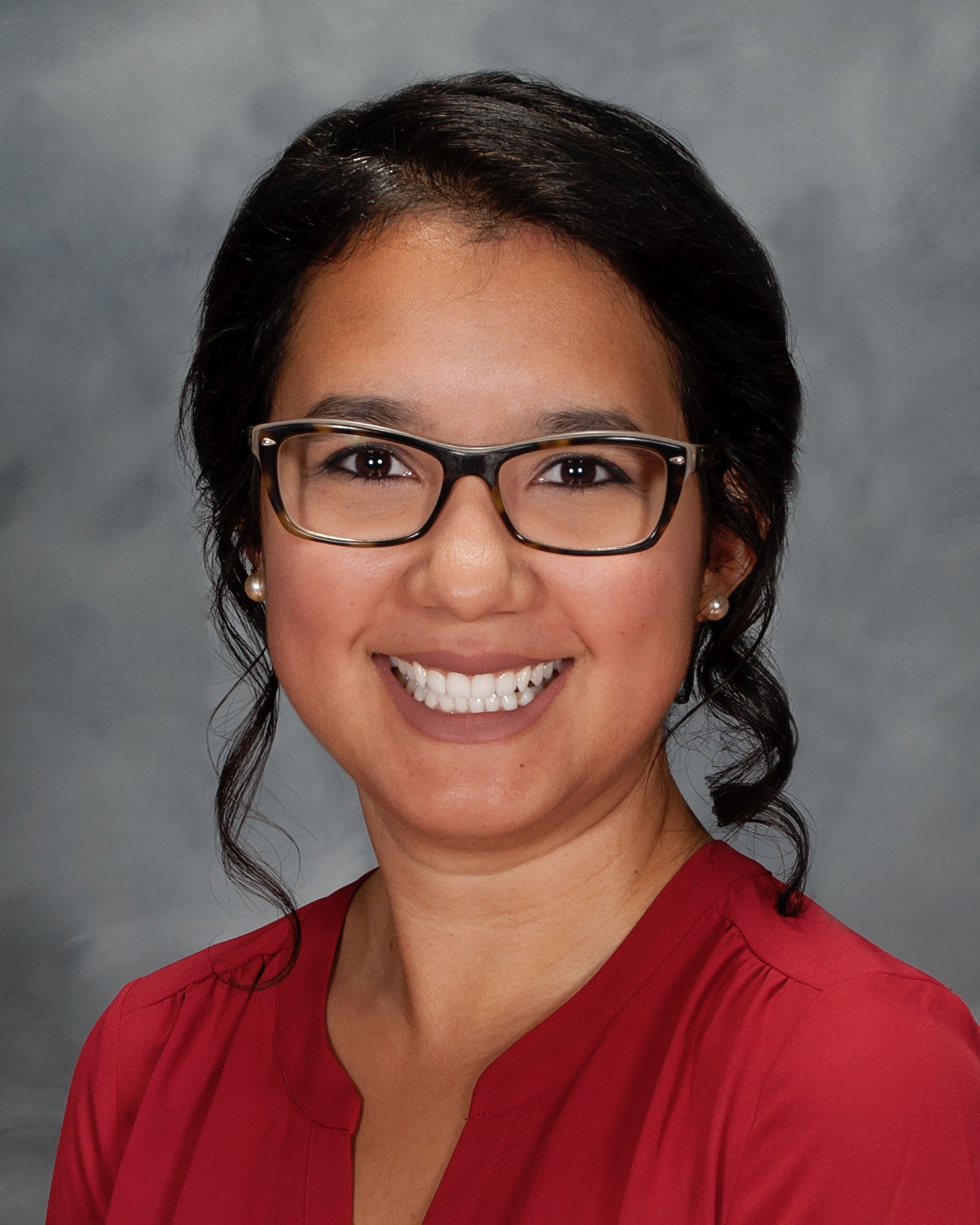
Profession: Pediatrician, Tanana Valley Clinic, Fairbanks
Degrees:
- B.S., Biological Sciences, University of Alaska Fairbanks
- M.D., University of Washington (WWAMI medical program)
- Internship and Residency in Pediatrics, University of Arizona
As a young girl with roots in Puerto Rico, Carla Cartagena De Jesus knew she wanted to be a physician. Her career goals set this first-generation college student on a fascinating trajectory that led her to Alaska, where UAF and Fairbanks supported her in more ways than one as she worked toward her medical degree and landed a job doing what she loves.

Please tell me a little bit about yourself.
My name is Carla Michelle Cartagena De Jesus. I was born in Puerto Rico and my family was military so we moved all around; we were stationed in Alaska. I graduated from the University of Alaska Fairbanks with my bachelor’s degree in biological sciences and then I went to medical school through the WWAMI program through the University of Washington. Then I did my residency in Tucson, Arizona and I came back to Fairbanks to work.
Was it always your plan to come back to Alaska?
It was, yeah. One thing as a military kiddo – you never know where home really is. My family is in Puerto Rico, that’s my culture and that’s where my heart is, but I felt so welcomed when we were here and growing up in this community, and so this is the one place that whenever I moved anywhere and folks asked where are you from, I would say Alaska. So, I kind of knew from the beginning that I was going to come up and practice.
Had you always planned on becoming a physician?
Yeah. As a kid I think I bounced back and forth with things, but pretty early on – I’d say late elementary school, and middle school into high school – I knew I wanted to be in the medical field for sure.
I have family members who are nurses and my mom was a CNA (Certified Nursing Assistant), my dad worked medical logistics in the military in the hospital so I had that exposure. I knew that was the field and I reached out there and found that physician would be for me.
Most folks say, “What, we had no idea we wanted to be doctors!” and I say, “Oh yeah, I knew, and from high school.” If you talk with a lot of people in medical school and residency, especially now, their journeys were not as direct. A lot of folks were pharmacists, some were nurses, some were teachers or doing something completely different beforehand. One of my coworkers was a polar bear biologist and then she went into medicine and now she is an E.R. doc in Georgia. I think that that’s actually becoming the more traditional thing. Now there are many different backgrounds and varieties that I feel enrich the medical community in a cool way.
It sounds like you’ve had this passion from a young age. Was there anything in addition to exposure to the medical field that influenced you?
I haven’t told this to a lot of people because I like to keep my things personal, so I won’t go into too much detail – but I did have a family member who was very sick, with something that at that time they didn’t know much about. And so, I think I was maybe 9 or 11 when we went to Puerto Rico and I met her and it wasn’t the first time I had met her, but it was the first time I remembered meeting her. And she was older and she was very sick. She passed a couple months later and I have that image in my mind of my family being pretty nervous for me to be around her since they didn’t know much about it, and how she just wanted that human touch. I remember her eyes and I remember her grabbing my face and I remember that touch.
There was something about that that I think about very often when I take care of people’s family members because it is such a vulnerable situation to be in, to be sick, and families are entrusting you with one of their most precious people in their life. In anything in medicine, someone is entrusting you with their life and their health, and that touch is such a huge thing to let them know that you’re there. So, it was strange for me that that was a spark.
Having seen my parents work so hard is another inspiration and reason I worked so hard to get where I am. Seeing them come from literally nothing to now being in the medical field contributing (to medicine) the way that they are.
Were there other memorable milestones in your journey to become a physician?
As a first-generation college student, it is kind of funny because every milestone was a huge deal. I’d talk with other folks and they’ll say, “oh, it’s just high school,” but I have family members who never graduated high school or got their GED so this was a big deal for us and then college was huge. And being the first physician in my family was a great symbol not just for my parents, but even for my cousins back in Puerto Rico.
I did this Della Keats program in Anchorage which was amazing. It was awesome exposure with a bunch of other high school students. And it wasn’t just for physicians, it was any person who was interested in the medical field including pharmacy, nursing, or PA (physician assistant) and it was just a nice way to introduce us to what medicine is. We did anatomy, autopsies, microbiology, and stuff like that.
Also in high school, we had to do a project about a health problem here in Alaska and then teach about it and do advocacy. I forget what drew me to fetal alcohol syndrome – I think I was just kind of looking around at some of the data and we had some of the highest rates in Alaska, and I saw that Fairbanks has what we call a “FACES” (Fetal Alcohol Community Evaluation and Services) team through the Alaska Center for Children and Adults, which helps diagnose fetal alcohol syndrome.
I think there is a stigma of, if you had alcohol during pregnancy your child has fetal alcohol syndrome, but that’s not the case, it is a spectrum. So, it could be full-on fetal alcohol syndrome or it could just be behavioral stuff without any of the facial features or growth issues. FACES is a great team with a psychologist, a physical therapist, a speech therapist, and a physician. So, in high school and undergrad I followed them and I did some advocacy stuff at UAF and now I am the pediatrician in town who helps with the team. It came full circle!
What made you decide to go to the University of Alaska Fairbanks?
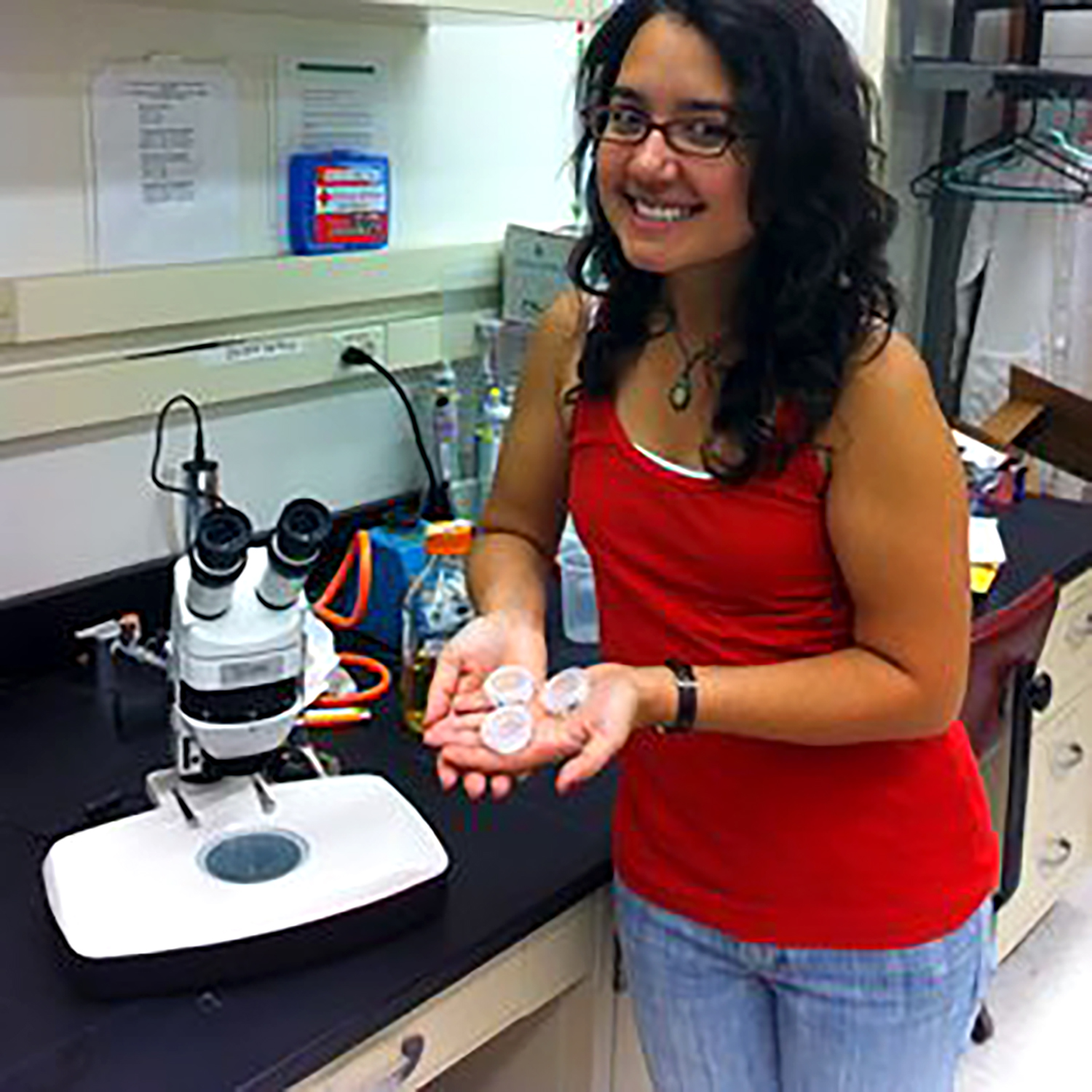
Like I said, for me Fairbanks is home. I wasn’t ready to go just yet and I thought, “Maybe I want an Ivy League school and to go away, and my folks said, “You should look into UAF.” When I looked there and I saw the research opportunities, and then they had options where you could make your own degrees and fill out your own courses. Initially I think I was a biochemistry major and then I switched to biology. I loved my classes. They were amazing. It was a smaller school which was great for me. I remember I felt like I really knew my professors, I could go to them anytime, I felt super comfortable with that. My TAs were great. It was just a fun environment and location in Alaska. It’s amazing.
For me too, the opportunities for scholarships at that time were great. The fact that I had the opportunity to pay for some of those expenses, and the research opportunities – that was a thing that also kept me here. There are so many research opportunities here it is amazing! I didn’t know until I was actually in college how big our engineering programs are, how strong our science programs are.
So that really opened a lot of doors for me, getting into research and meeting people and making those connections. I was able to finish in three years, and then that next year I took to study for my MCAT. I did AmeriCorps here in town at the Denali Center and I still did research at UAF.
Wow, all in that one year.
Yeah, it was a lot. But it was fun! I really liked it. I loved my lab, I loved Denali Center. It is an assisted living home connected to the hospital with an acute section for people who are going to go home in a couple of days, and there are also folks who live there chronically and they have nurses and physicians there. We do activities with them and it’s really nice. I loved working with that population there, I would plan the activities for the elders, it was really fun.
So you’ve worked with the whole spectrum of patients, between pediatrics and elders at the Denali Center.
Yes, and I think I gravitated towards the elderly too because in a way it’s a similar population in the sense that they require a little bit more. They’re very vulnerable – they can definitely hold their own, but sometimes they need a little more assistance.
What are some of the things you love about being a doctor now?
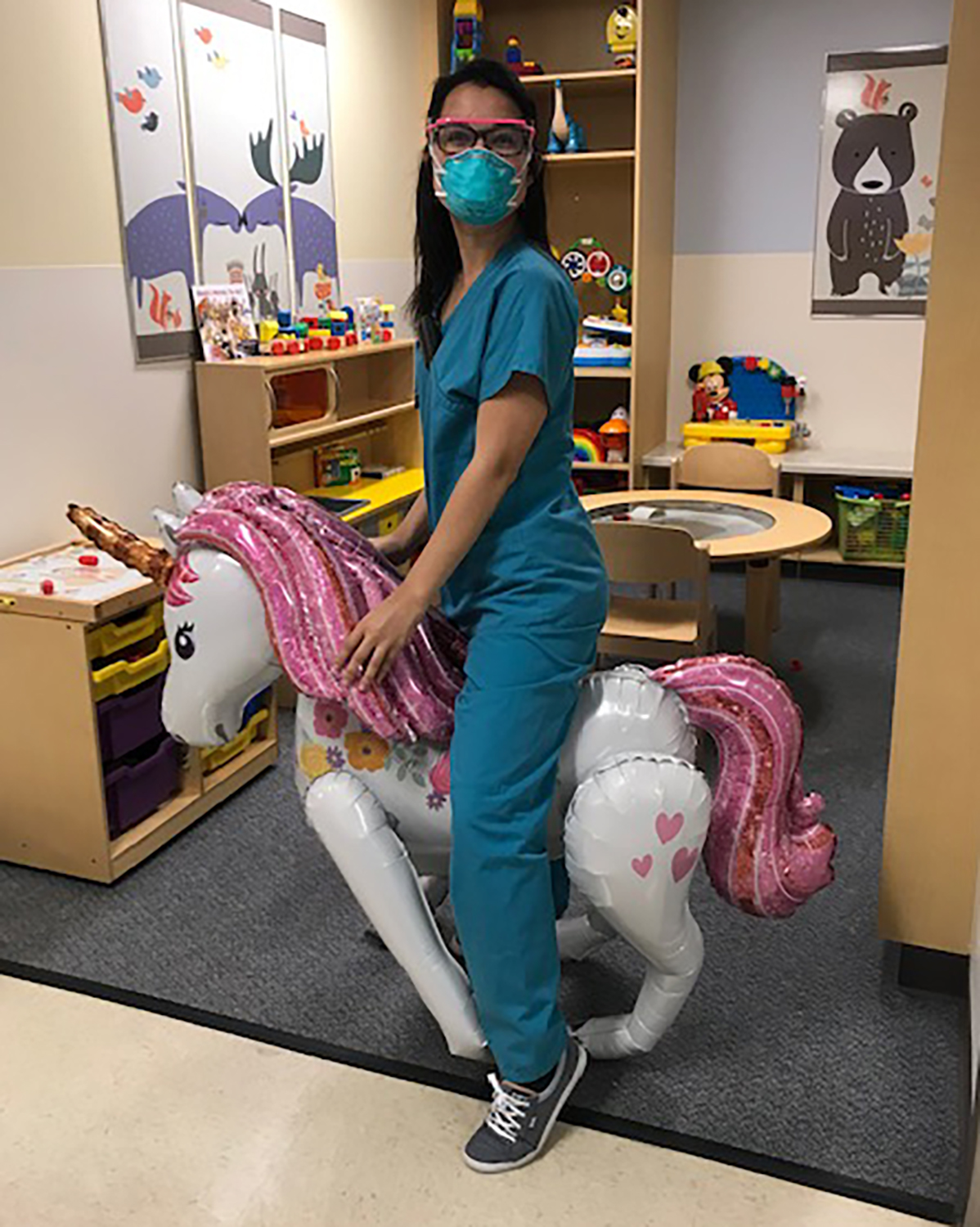
Being there when moms deliver their babies and being the first one to introduce moms to their babies. Or if babies are sick being able to help. When the kids are admitted to the hospital, from a cough to something very serious, being the person who is trying to make things better, being there for the family, consoling them, letting them know you’re doing everything right. Telling them, “you did the right thing bringing them here and we got it, we got your back,” and then being able to see them go home happy.
Here in the hospital we do the NICU which is the neonatal intensive care unit. We do nursery – those are all the babies who are born in the Labor and Delivery unit who stay in the room with mama. And then we do the pediatric floor, so all the older kids who are admitted for whatever reason. And then we do clinic. In the clinic, we see our kids who are happy and healthy or who have stubbed their toe and mom wanted it checked out, or something like that. So, talking with the patient in a way to make them feel like everything is okay and making it fun if we can – if it is an appropriate time to make things fun.
I don’t have kids, but I have seen that every child is different and there is no playbook for it. Parents kind of turn to you for guidance on how to be a parent and from what I have seen, there are wrong ways, but there are mostly right ways. Families just need that reassurance sometimes. And at those clinic visits you just show them, “Look at your kid man, he’s awesome, you’re doing great”.
Kids are amazing. They are so resilient. They say some of the funniest things. I am always laughing at work. I just love it.
I assume right now you’re also dealing with a lot of uncertainty with the coronavirus.
Yeah. Which is hard because it’s trying to comfort them through all of it, even though we don’t know a lot of information [about the coronavirus]. Especially at the beginning, that was really tough because they were asking, “How does it affect us, how do we know, what do we do,” and so trying to navigate through all of that, but also trying to be there for them for the things that aren’t COVID-related. I think a lot of folks were deterred to reach out for medical help because they thought they would get COVID but, it’s getting a little bit better.
Were there any challenges or barriers that you had to overcome to get to where you are now?
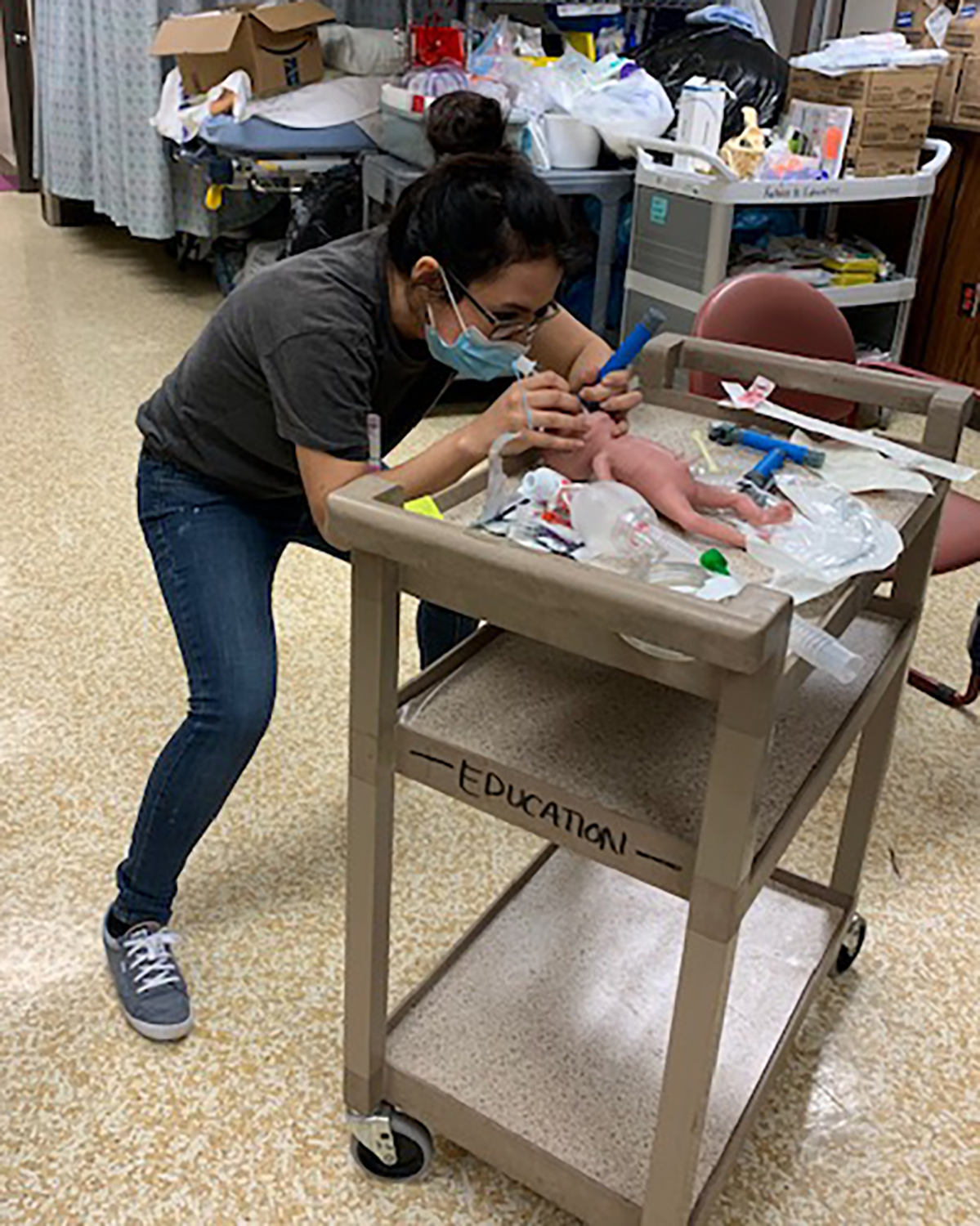
So, I have to say that for being from the background that I come from, I am actually extremely fortunate. I think the things that I mentioned – my folks being from Puerto Rico and growing up in a different kind of household with a different culture from the people around me – I wouldn’t say it was a barrier, it added to who I am and my personality and my drive.
The only barrier I found was people’s perception of why I am where I am. Folks thinking I got handouts when I didn’t, but I think actually that pushed me harder.
When I was really little - like in kindergarten - my dad said, “You have two things against you, you’re a female and you’re Hispanic.” Which is kind of a tough thing to say to someone who is in kindergarten. It stuck forever.
I worked hard and I loved what I did and I had a supportive family thankfully, but initially with me they didn’t have a lot of money. They were in the military, but young, 19 and 21. So them trying to navigate that and being new parents, you know we started off differently than how we are right now.
And so, I think that upbringing initially made me who I am as a person, and then being told by my father, you know, you’re Hispanic and you’re a woman, that kind of set my tone in the sense that I have to give 110 percent to show that I earned what I have, that I’ve earned my place here. I have had many people say, “Well you got that because you’re Hispanic. You got that scholarship because you’re Hispanic or you got chosen for that medical school because you’re Hispanic” and that’s so not fair.
You start doubting yourself and what you’re doing and think “Was I really given this because they wanted me as a statistic on their paperwork?” It sucks to hear that and you hear about it on the news all the time.
But because of what my dad said I always gave my 110 percent and so I always had (that effort level) as a backing saying, “If you can one-up this – okay, then you deserve it. But I got it, I deserved it.” I wouldn’t say that was an everyday thing, but there were definitely moments where I had to stand up for myself and say, no, I worked to be here and I deserve my place here.
I would turn to my family or very close friends and say, “Hey, this happened” and they would remind me “There’s no way that you didn’t deserve this. There is no way that you didn’t work your tail off to be where you are today. Nobody can doubt that.” But it does hurt. It hurts to hear that when you have studied for hours and busted your bottom in high school and college and then somebody comes and says that.
As I got older I didn’t hear it as much. I don’t think I hear it at all anymore. I think the folks that I surrounded myself with knew the struggle that it was to be where we are and we respected the diversity that comes with that too.
What would you tell other students who might face similar barriers or challenges as they start their journey?
At UAF what was nice was I was able to find an advisor. I feel like (without an advisor) I would have had more barriers and I just wouldn’t have known what to do. It is a whole new environment to be on your own and trying to figure it out.
I had multiple advisors, it is so important, and it doesn’t even have to be a person that’s going into your field. Sometimes you don’t even know what you want to do just yet, but it is just making those connections that is really helpful. They can help you and say, there is this person who does this research, or there is this conference over here. Or they can sit down and realistically tell you how to schedule your workload so that you can keep sane through this crazy life that we live – not just college, but everything.
I have my family that supports me, my mom and dad and my brother. A lot of people don’t have that. So, when you don’t have that you really have to work harder to get that support and find those people because you will need personal support too.
What is different about your job or career than you originally thought when you were a student or when you were dreaming of being a physician?
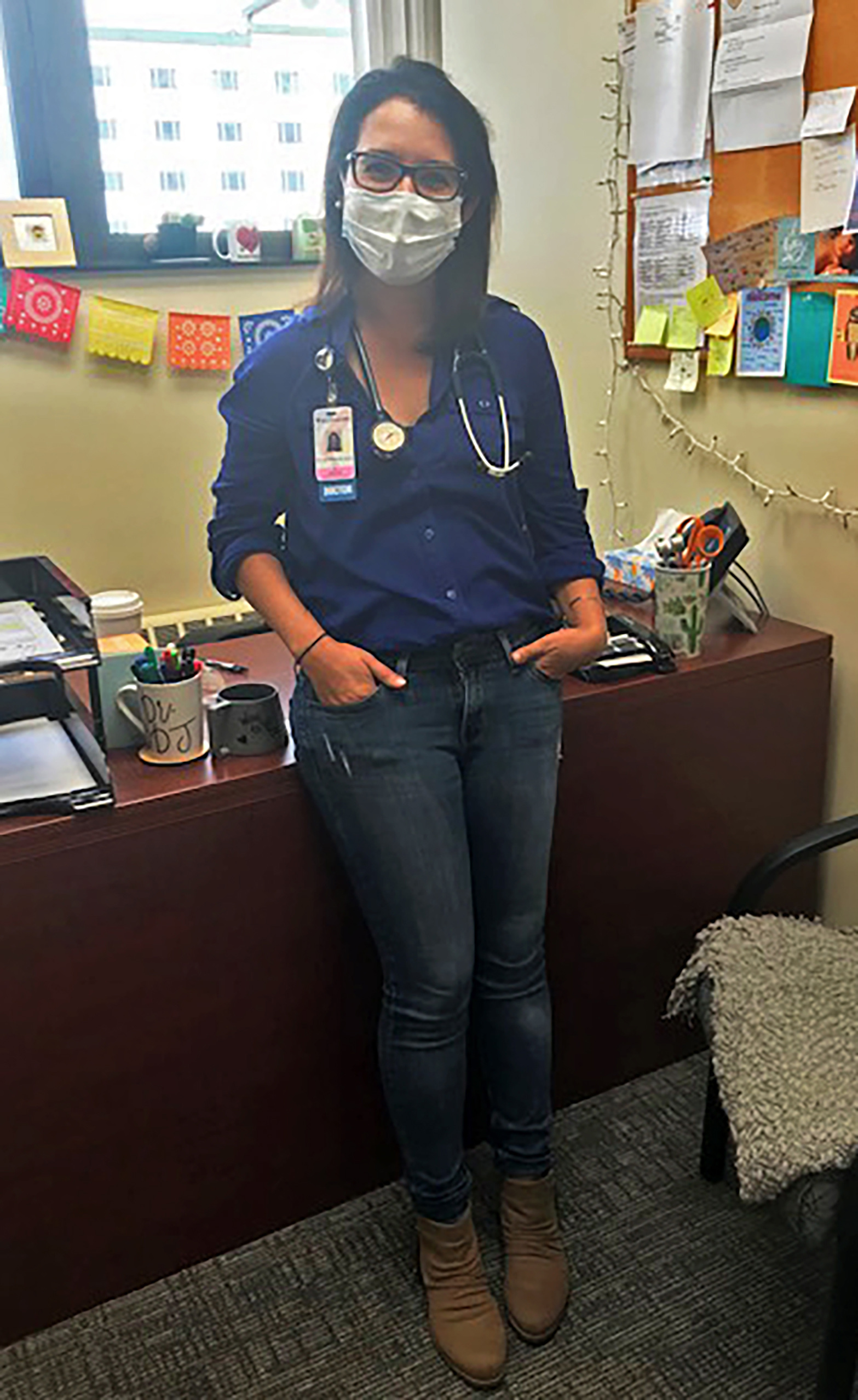
I think that what I didn’t know is the impact that patients and their families would have on me. You think that you’re a physician, you’re healing, you’re providing care for others. But you don’t realize how connected you become to those families and how much influence they have or the impact that their stories or their lives have – whether they do well and the kid walks out the door, or they pass away. Those kids also have stories and they really stick with you. We never forget those kids. So that impact that they have.
And, how fun it was going to be. I knew I wanted to be in something I loved, but it is fun every single day and I’m surrounded by people who love it too. Luckily, I’m in a pediatric group who love what they do and they’re awesome so that’s super fun.
It is pretty taxing. I say all these bubbly things, but it is pretty draining sometimes. It is draining on the soul and the spirit and the mind and physically. I just did a 24-hour shift, sometimes we do 36, sometimes we do 48. And honestly sometimes they send a message and it’s almost like you’re on 24/7 because you want to help.
Yeah, so it is pretty exhausting, but you also need some space. You need to heal yourself, you need to take care of yourself to be able to take care of others.
What advice would you give to a student considering a career in STEM?
Honestly, just don’t let anyone or anything stand in your way. And do what you like to do. I love what I do, and I think I am super lucky that I found it and I’m here.
It is okay to change too. You could change from a polar bear biologist to an E.R. doc! If you are in something and you realize, this is not my passion anymore, or I feel like I need to go a different route, that is okay. But we do need more people in STEM fields so if that’s where your passion is, go for it!
Interview by Courtney Breest, Alaska NSF EPSCoR. Click here for more Faces of STEM. All photos courtesy Carla Cartagena De Jesus.

